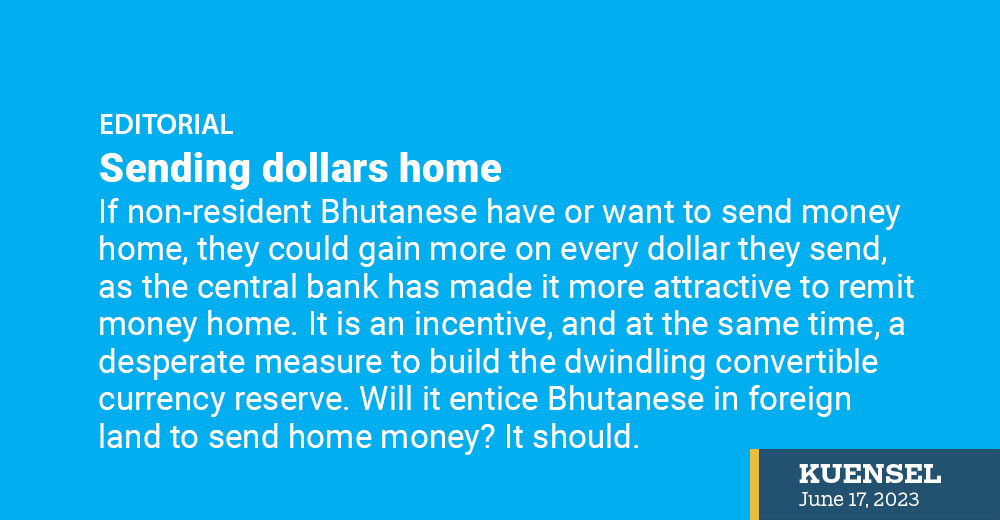If non-resident Bhutanese have or want to send money home, they could gain more on every dollar they send, as the central bank has made it more attractive to remit money home. It is an incentive, and at the same time, a desperate measure to build the dwindling convertible currency reserve.
Will it entice Bhutanese in foreign land to send home money? It should.
The Australian rush has dominated the current discourse on emigration and reducing the inflow of convertible currency. It is true that a handful of Bhutanese with permanent residency permit are selling their belongings, land and buildings in Bhutan to invest in properties in their newfound home. This may prevent inward remittance, but there are thousands of Bhutanese beyond Australia.
The central bank’s initiative will encourage NRB to send money home. Going abroad to work is the trend today whether it is in the Middle East, Canada, the USA or Australia.
Many chose to leave with the hope to earn and secure their lives. Almost all send money home to help their parents or siblings. The success story of a new house built in their village or being able to fund the education of a sibling, has appealed to many, resulting in the rush to emigrate. Not all will settle in a foreign land forever, and not all will get the opportunity. Not all Bhutanese in Australia are building houses or buying properties to stay back. Many will return home.
Given the number of Bhutanese working abroad, remittance could play a pivotal role in building the country’s foreign reserves. It was one time nearly 4 percent of the GDP. Many South Asian countries rely on remittances. However, remittance was never the main source of foreign currency for us.
While initiatives to ease the flow of remittance is good, we could look at others to ease the pressure on the declining reserves. There is a moratorium imposed on construction of commercial housing and hotels to prevent the outflow of foreign currency. With 90 percent of materials and furnishings imported, it will ease the burden on INR and USD.
A moratorium is already in place on the import of vehicles. Figures with the central bank show that the country’s foreign currency reserves have declined by about 30 percent to USD 698.3 million as of March this year from USD 984.8 million in March last year. This is a huge concern for a country that imports everything from salt to petrol, vehicles, and machinery. There are also goods that are not necessary to be imported. For instance, if we look at the shelves in our groceries, we have enough unhealthy items that are draining out the scarce foreign currency. Why not ban certain junk foods to save a few dollars more?
What about incentives and subsidies to encourage people to switch to electric vehicles? The import bill of fossil fuel almost offset the export of electricity. If we can replace half of the pool vehicles with electric cars, our balance of trade would improve, while the pressure on INR would ease.
What is preventing dollars from reaching home is the so-called money traders working from outside Bhutan. It is said that students in Bangkok, Thailand or in Australia are preventing dollars from reaching home. Better exchange rates and convenience is the main factor. Can we offer more attractive incentives?


